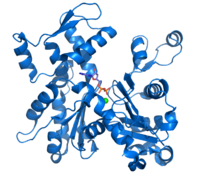
Photo from wikipedia
Introduction & Hypothesis: Alveolar macrophages (AM) are critical to chronic obstructive pulmonary disease (COPD) pathogenesis. Evidence suggests they are defective in internalisation which could drive exacerbations where human rhinovirus (HRV)… Click to show full abstract
Introduction & Hypothesis: Alveolar macrophages (AM) are critical to chronic obstructive pulmonary disease (COPD) pathogenesis. Evidence suggests they are defective in internalisation which could drive exacerbations where human rhinovirus (HRV) is frequently isolated. We hypothesised HRV infection of macrophages were key drivers of this defective internalisation. Methods: AM isolated from bronchoalveolar lavage (BAL) or monocyte derived macrophages (MDM) were challenged with HRV16 and then with various triggers and internalisation assessed by microscopy. Changes to the actin cytoskeleton following HRV16 infection and following particle internalisation were assessed also by microscopy. Results: AM or MDM challenged with HRV16 demonstrated deficient internalisation towards multiple triggers. Internalisation was deficient in COPD AM and reduced further upon HRV16 infection. HRV16 infection of macrophages altered the actin cytoskeleton around internalised particles and decreased the protein expression of key actin regulators. Our results also identified a novel actin regulator targeted by HRV16. We are currently combining in depth cell biology and super-resolution microscopy to further interrogate how HRV16 disrupts the actin cytoskeleton in infected macrophages and the role for this protein. Conclusion: Our results demonstrate that HRV16 infection impairs various macrophage internalisation pathways by disruption of the actin cytoskeleton and affects the expression of key actin regulators. Addressing these key regulators of actin function disrupted by HRV16 highlights a unique opportunity to therapeutically target macrophage cellular pathways to improve patient outcome in COPD.
Journal Title: European Respiratory Journal
Year Published: 2018
Link to full text (if available)
Share on Social Media: Sign Up to like & get
recommendations!